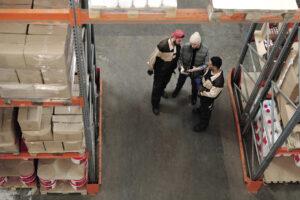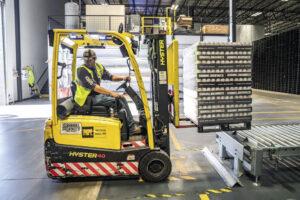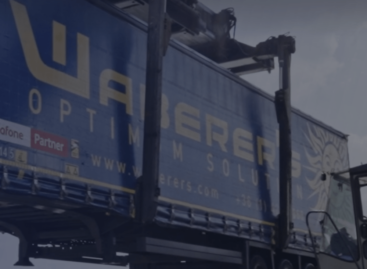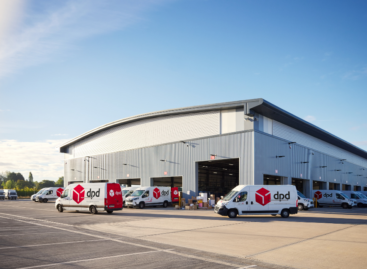New waves in logistics
Transforming consumption habits, expanding e-commerce and the demand for fast deliveries are all key drivers in the logistics sector. Plus digitalisation and the use of new technologies are essential for service providers to remain competitive.
This article is available for reading in Trade magazin 2024/8-9
Strengthening fulfilment service

Mihály Panyi
director of parcel logistics
technology and product
management
Magyar Posta
“Today warehouses don’t just manage the physical storage and distribution of goods: they also manage data – one of the most important raw materials of today – which helps to optimise the supply chain”,
says Mihály Panyi, director of parcel logistics technology and product management at Hungarian Post Zrt.
Hungarian Post offers its parcel logistics services under the MPL brand.
The SMART by MPL fulfilment service is a complex system that Hungarian Post has developed itself. The fulfilment centre has a robotised capacity of 800m2 and 10 packing stations with a capacity of up to 1,000 parcels per day. They plan to build their parcel processing logistics centre in the autumn of 2025, which will be capable of processing around 30,000 parcels per hour.

The abrupt development of modern technologies create brandnew opportunities
Focusing on consumer needs

Attila Balázs
managing director
GLS Hungary
Attila Balázs, managing director of GLS Hungary reports that the GLS XXL service, which specialises in the delivery of large parcels and was introduced just over a year ago, is more and more popular.
“We have a network of around 1,070 GLS ParcelPoints and nearly 1,850 GLS Parcel Lockers. From these parcel lockers are particularly successful, as the vast majority are available 24 hours a day”,
adds Attila Balázs.
Recently the company introduced the Locker Return Service for online shops. In Hungary the market is very price-sensitive.

László Bory
head of sales and marketing
DHL Express Magyarország
“Fulfilment is becoming more popular, although there are limitations and it isn’t possible to outsource the logistics for all products. Plus we have seen several acquisitions, mergers, rationalisations and investor cooperation projects in the Hungarian market this year”,
informs László Bory, head of sales and marketing at DHL Express Magyarország.
Green alternatives
DHL Express Magyarország’s key service is air freight, known as Time Definite International. With their own fleet they provide 1-2-3 day, express tracked delivery to 220 countries and regions worldwide. The company’s customs team provides a range of services to help with customs issues. Partners have a dedicated contact person who helps them to ensure that the logistics associated with their business run smoothly.

Glória Garamvölgyi
managing director
WSZL
WSZL, a subsidiary of Waberer’s Group, offers a wide range of services.
“We have installed semi-automated copack machines for FMCG products and have also started to introduce voice picking based fulfilment methods”,
says Gloria Garamvölgyi, WSZL’s managing director.
In order to be sustainable, they aren’t only increasing the number of their electric and LNG vehicles, but are also developing long-term, tailor-made green concepts for their customers. There is growing interest in their e-commerce services from both electronics and FMCG manufacturers.

Warehouses of today not only physically store and distribute goods, but also manage data
Simply and quickly

László Varga
sales and marketing director
DPD Hungary
László Varga, sales and marketing director of DPD Hungary Kft. cites the new government decree that all online shops selling in Hungary must list Hungarian Post among the delivering companies – this is one of the major changes this year.
“This suddenly appearing regulation has raised a lot of questions among both competitors and customers”,
says László Varga.
Another notable change is the increase in road tolls, both in Hungary and in neighbouring countries. Wine Logistics is a new service offered by DPD Hungary Kft., with a full guarantee for the delivery of bottled products. All shipments are easy to track and the delivery options are reliable and environmentally friendly. Standard services include door-to-door delivery with time-guaranteed next-day delivery and a 1-hour delivery window. The company has more than 800 parcel points and almost 200 parcel lockers across the country. There is a growing demand for products to be delivered as quickly as possible – preferably the next day – and for the delivery window to be adhered to. There is also an expectation that the time and place of delivery should be at the customer’s discretion, and that the return handling should be simple and quick.

Tamás Fábián
director of strategy
and business development
Ghibli Group
“New environmental regulations and expectations are forcing logistics service providers to develop a more sustainable strategy. This includes the use of more energy-efficient vehicles and warehouses, as well as measures to reduce carbon emissions”,
outlines Tamás Fábián, director of strategy and business development at Ghibli Group.
Expanding warehouse capacity
Ghibli Group guarantees that partners get fast, on-time and high quality deliveries, as well as the up-to-date tracking of goods and almost instant POD access with the company’s mobile app. With more than 100,000m2 of warehouse capacity, they offer complex warehouse logistics services at 7 locations nationwide. Warehouses have automated systems for managing products quickly and efficiently. Ghibli Group offers full customs clearance services for export and import shipments by road, air, rail and sea, tailored to customer needs. This year they opened a smart warehouse in Vác, where 700 robots support automated operations in more than 30,000m2 of warehouse space.

Dániel Schmidt
chief strategy officer
Boxy
Dániel Schmidt, chief strategy officer of Boxy Logistics Zrt. calls attention to how small parcel logistics– which is heavily dependent on e-commerce – is suffering these days. Companies are trying to compensate for this by handling large volumes from the Far East, but these are detrimental to the quality of domestic service.
“We do webshop services, expiry management, prize game management, parcel assembly and returns management. In addition to these, if the FMCG demand proves to be sustained, we will consider building a cold/frozen storage capacity”,
says Dániel Schmidt.

The demand for automated systems has seriously increased
Automated warehouses

Márton Palasik
sales director
SSI Schäfer Systems
International
Márton Palasik, sales director of SSI Schäfer Systems International Kft. reports that there have been great changes in the development and expansion of automated warehouse systems recently.
“Government tenders play an important role in improving logistics systems. SSI SCHÄFER is committed to assisting its customers in the tendering process, thus contributing to more efficient and modern warehousing solutions”,
emphasises Márton Palasik.
Some of their most popular services are automated storage methods such as high-bay systems and dynamic storage options. In the near future SSI SCHÄFER plans to expand the use of data-driven processes and AI in their warehousing and logistics systems.

Endre Szabó
CEO
GLABS LSS
According to Endre Szabó, CEO of GLABS LSS KFT., almost everywhere the focus is now on optimising warehouse operations. One of the means to achieve this is the efficient organisation of loading operations and the optimal use of human and technical resources required for loading.
“The Time Slot management and Yard management modules of our GLABs software range take care of the management, planning and precise measurement of loading processes, in which there has been growing interest over the last six months”,
says Endre Szabó.

Sustainability is now also important for forklift trucks
Warehouse robots and smart pallets

Zoltán Horváth
managing director
Jungheinrich Hungária
Zoltán Horváth, managing director of Jungheinrich Hungária Kft. reckons that their biggest advantage is that they offer a full range of services, from concept development, products and implementation to operation supporting services and machine recycling.
“Since March 2023 Jungheinrich has been producing only electric forklift trucks, so our developments are all geared towards sustainable and efficient operation. The clearest trend is the development and mass adoption of mobile robots. There is also a focus on environmentally friendly operation, the associated safety factors and new types of digital services”,
opines Zoltán Horváth.

Ferenc Polgár
managing director
P&P Budafok
Ferenc Polgár, managing director of P&P Budafok Kft. has seen a drop in demand for pallets at the end of 2023 and in early 2024. In his view pallets are also going in the direction of digitalisation. The tracking and continuous monitoring of goods is more important, and the tracking of the pallet as a collective packaging can be of great help in this. This is why pallet “smarting-up” has been going on for years.
“Most recently EPAL presented its new ‘smart’ innovation. This involves putting a QR code on each pallet, which anyone can read with a mobile phone. As this solution is cheap and can be used anywhere in the world, it will certainly be a great help in logistics”,
predicts Ferenc Polgár. //
Related news
DPD Hungary Kft.: Official statement regarding year-end delivery delays
🎧 Hallgasd a cikket: Lejátszás Szünet Folytatás Leállítás Nyelv: Auto…
Read more >Related news
40 secure jobs, sustainable solutions – new BURGER KING® in Csepel
🎧 Hallgasd a cikket: Lejátszás Szünet Folytatás Leállítás Nyelv: Auto…
Read more >(HU) METRO Gasztro Fesztivál a SIRHA Budapesten – Élmény, inspiráció és valódi megoldások a HoReCa-szakmának
🎧 Hallgasd a cikket: Lejátszás Szünet Folytatás Leállítás Nyelv: Auto…
Read more >









